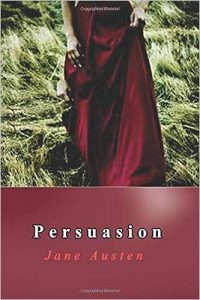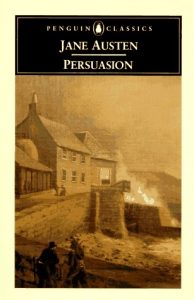It was the first Jane Austen novel I read after Northanger Abbey, which was my O Level set text. Part of the Bishop Otter College English course, Persuasion inspired me to read the other four Austen novels over the next couple of years. I revisit them all fairly regularly but it’s a while since I’ve been back to Persuasion which was published in 1817, after the author’s death.
I’m immediately struck now by the precision of its setting. We’re often told that Austen completely ignored the war which raged for most of her life and wrote only about the insularity of country houses. Well Persuasion certainly debunks that. It’s set immediately after “The Peace” (Waterloo, 1815), which is often mentioned, and the novel full of naval officers who have worked together commanding war ships and are now returned home, in some cases with newfound wealth. The war is frequently referred to although it’s obviously true that Austen’s only experience comes through hearing men talk about it – so that’s what she writes about.

Eight years before the novel opens, Anne Elliot, Austen’s most mature heroine, fell for Captain Frederick Wentworth and he with her. She was, to her long lasting regret, “persuaded” by her family that the match was unsuitable because Wentworth had no money or title. Inevitably he shows up, still single, soon after the novel opens. Thereafter he is a frequent presence in the Elliot social circle including at Lyme where Louisa Musgrove’s accident becomes pivotal to the plot. Anne’s feelings haven’t changed. The question, in a third person narrative presented from her point of view, is have his? And, just to make matters convenient the war has enabled him to amass a fortune of £25,000. There is embarrassment, awkwardness and a lot of misunderstanding as the plot winds towards its conclusion and Anne, gradually, begins to detect what a 21st century woman might call “vibes”. It’s the usual Austen big scale sisters, cousins and aunts cast in which the happy ending is an inevitability from chapter 1. It’s a letter rather than a “clinch” which clinches (sorry) it and I love this terse sentence, laden with feelings, subtext and understatement, which follows Anne’s reading of it: “Such a letter was not to be soon recovered from.”
Austen’s characterisation is nine tenths of the reason we still read (and dramatise and discuss) her over 200 years after her death. Anne’s father, Sir Walter Elliot, “a foolish, spendthrift baronet,” is beautifully observed in all his shallow, judgmental, narcissistic awfulness. His other daughters, Mary, married to the long-suffering Charles Musgrove, and Elizabeth, who’s still at home are, in their different ways very much like their father. We presume that Anne’s pleasantness, quiet intelligence and sensitivity comes from her late mother – which explains why Lady Russell (wise, nuanced and willing to admit mistakes), a dear friend of the late Lady Elliot, is so fond of her.
Austen is good at cads too. Who could forget charismatic but amoral Mr Wickham in Pride and Prejudice for example – initially attractive but definitely Bad News. The man up to no good in Persuasion is Mr Elliot, a cousin who stands to inherit Sir Walter’s estate. He rather desperately doesn’t want the silly old man to remarry and produce a direct heir so he schemes to prevent it – but, my goodness, he’s a charmer.
People sometimes ask me to name a favourite author or book and, of course, like most voracious readers, I can’t. The truth, especially if it’s a “classic”, is that it’s usually the one I’m reading now. So this week Persuasion is getting my vote.

Next week on Susan’s Bookshelves: Sonnets by William Shakespeare